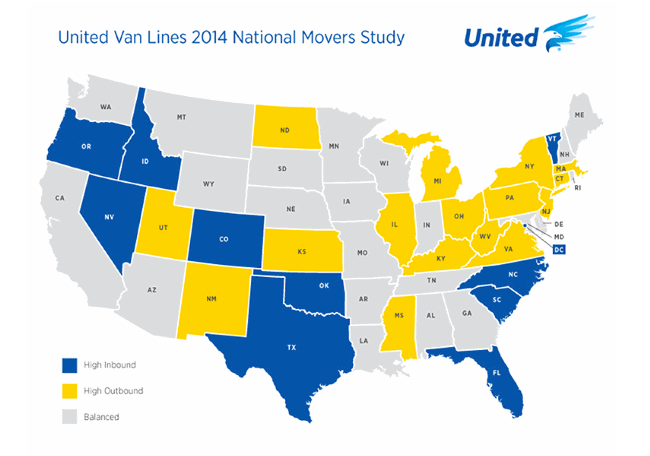More families moved out of Ohio than moved into the state last year, according to reports from three of the nation’s largest moving companies.
While each company’s records show only a small subset of all relocations across state lines, their annual reports offer a glimpse at interstate migration before the release of the U.S. Census Bureau’s yearly state-to-state migration data.
Ohio’s ratio of inbound to outbound moves ranked 44th of the 48 contiguous states and the District of Columbia in the United Van Lines 2014 National Movers Study. United listed Ohio as a “high outbound” state because more than 55 percent of the company’s 7,641 Ohio moves were outbound.
United reported 1,371 net outbound moves in Ohio during 2014. Of the 48 contiguous states, only New Jersey, Illinois and New York had a higher number of net outbound moves than Ohio.
“With Ohio’s middling job growth since 2011, it isn’t a surprise that people are voting with their feet by moving to states where opportunities exist and the path to prosperity isn’t so long,” said Matt Mayer, president of free-market think tank Opportunity Ohio.
Ohio’s economy has added fewer than 300,000 jobs since January 2011, although the state lost 455,000 jobs from March 2006 through February 2010. For the first three quarters of 2014, Ohio’s job creation rate ranked 44th nationally.
In Opportunity Ohio’s most recent monthly Ohio Jobs Recovery report, Mayer projected Ohio would not likely recover to peak March 2000 employment levels until late 2020.
“I hope Gov. [John] Kasich and the General Assembly now move beyond the re-election rhetoric and realize Ohio remains mired in high government spending, slow job growth and pro-union policies,” Mayer said. “I wish Gov. Kasich would fight as hard on issues like right-to-work and less government spending as he does for expanding Medicaid and hiking the severance tax.”
Of the top 10 “High Inbound” states in United’s 2014 National Movers Study, seven were right-to-work states. Of United’s top 10 “High Outbound” states, only two were right-to-work states.





























